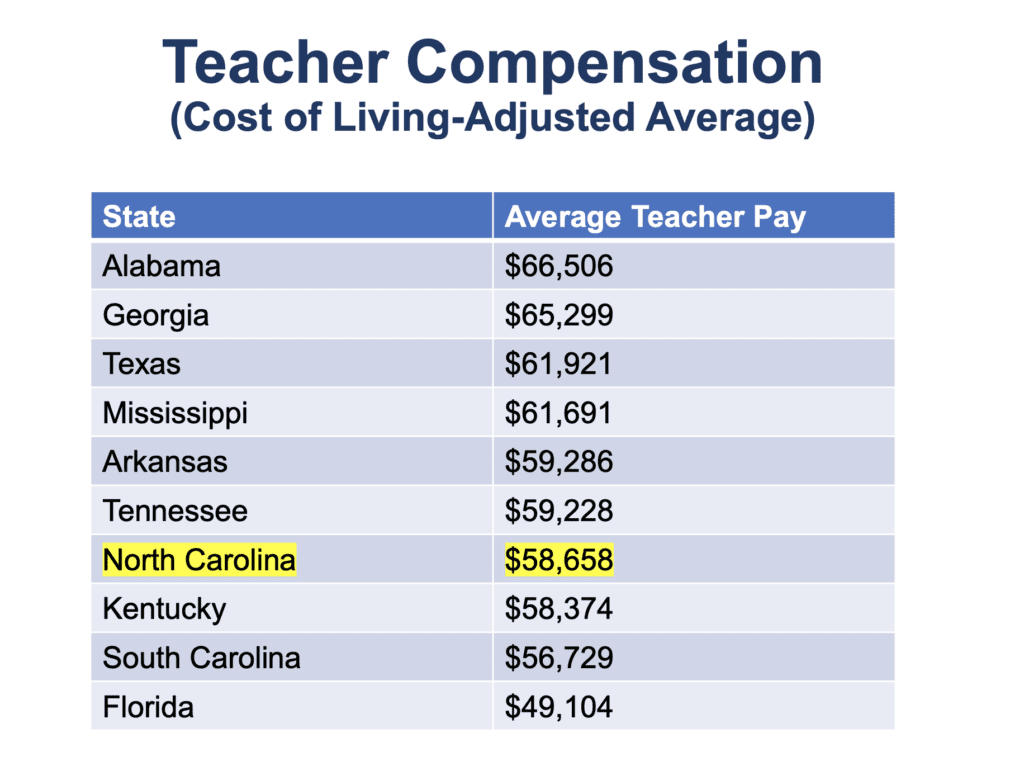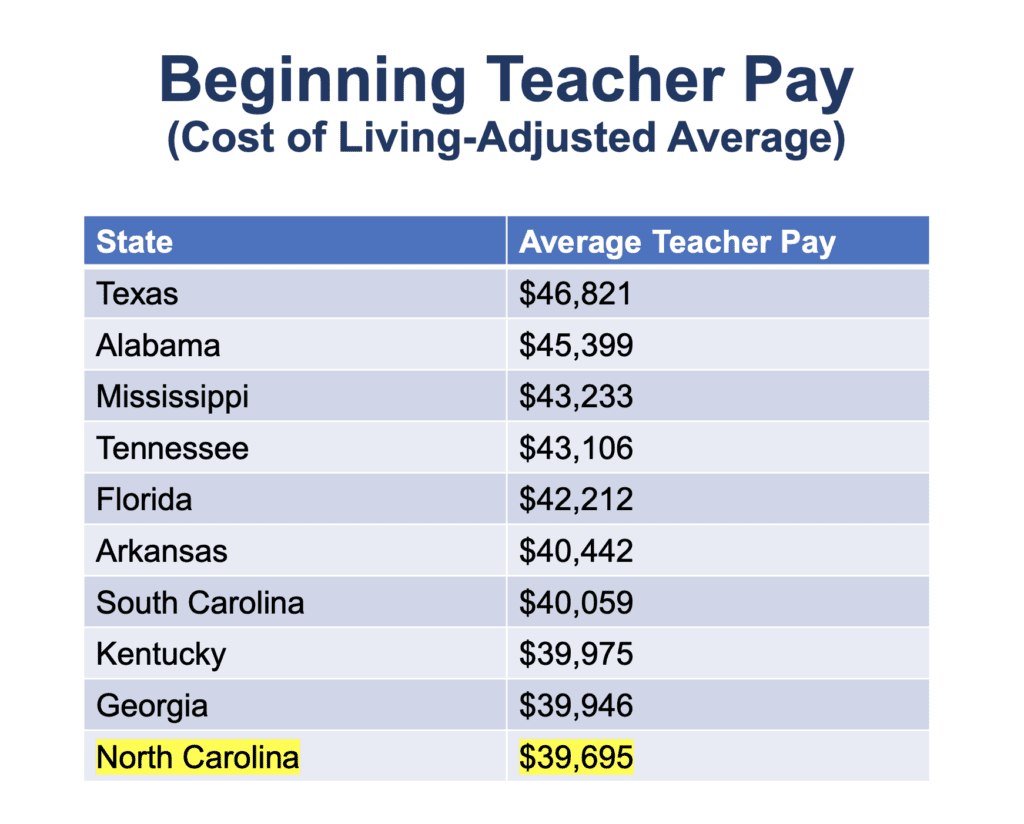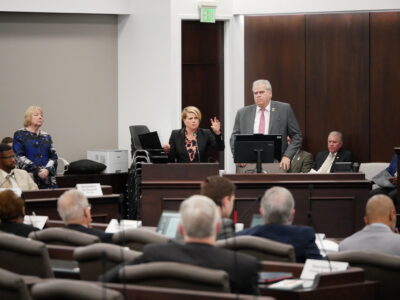

|
|
State Superintendent Catherine Truitt presented Thursday to lawmakers at a joint education appropriations meeting about the legislative priorities of the state Department of Public Instruction (DPI) and the State Board of Education for the biennium.
The priorities remain the same as they were when approved by the Board in January, including money for early learning, school nurses and social workers, and to eliminate the co-pays for reduced-price meals for students. But Truitt had the opportunity to expand upon them as she went through her presentation with legislators.
But first, if you need a primer on public school funding, go here. Go to the article below to read our prior coverage on the Board and DPI’s legislative priorities.
The licensure and teacher pay reform plan that is making its way through the State Board of Education came up in her remarks, as did teacher pay generally. The reform plan is controversial with some teachers because it will eliminate the practice of basing teacher pay on years of experience and move to a model that emphasizes teacher effectiveness. But, the plan does include much higher salaries for teachers than they currently receive.
The Board is planning on piloting the teacher licensure and pay reform plan, which will require lawmaker action. It is also planning on asking for funding for increased teacher pay for those districts participating in the pilot. However, the Board and DPI are still working on getting details to round out those requests.
According to the presentation, DPI and the State Board will also be coming back to lawmakers with specific asks around teacher pay and principal pay generally.
Truitt took lawmakers through a history of teacher pay in North Carolina, including the precipitous decline in North Carolina’s teacher pay rankings when compared to the rest of the country following the 2008 recession.
“Before the recession, before the Great Recession, North Carolina ranked 25th for teacher pay. So this would have been 2008-2009. And then the recession hit, and I was teaching in Johnston County during that time, and my pay was frozen, as was all teacher pay across the state,” she said. “By 2009-2010, we ranked 36th for teacher pay. By 2010-2011, we ranked 41st for teacher pay. And then the next year, 2011-12, we fell to 47.”
She went on to talk about the General Assembly’s investments in bolstering teacher pay in the years since, before talking about how other states in the Southeast have been investing “heavily” in teacher pay during the pandemic.
“And so now we’ve fallen behind our neighbors,” she said. “And unfortunately, when our young people are thinking about whether or not they want to go into this profession, they’re seeing average teacher pay in North Carolina at $39,695.”
Currently, North Carolina is ranked 34th in the nation for teacher pay for 2021-22, according to estimates from the National Education Association.
Included in the documents provided to lawmakers were the following slides.




When the meeting was opened up to lawmaker questions, Rep. Lindsey Prather, D-Buncombe, asked Truitt about her plans around the North Carolina Center for the Advancement of Teaching (NCCAT). A recent bill would put NCCAT under Truitt’s leadership.
Truitt is also asking lawmakers for professional development funds to be used through NCCAT. Prather questioned why the organization should be put under Truitt.
“They do a great job and we want them to be able to serve more teachers. They are aligned with (State Board of Education) goals. They are really well integrated into those communities,” Prather said. “I agree that we need to give more funding to NCCAT. I just don’t understand why the change in oversight is tied to that.”
Truitt said she disagreed that NCCAT was aligned with the Board’s goals.
“I’ve spoken with the State Board about this, and they support this request, provided that it comes with more professional development funding. Those two campuses can only serve a handful, I think it’s 60 in Cullowhee and 40 at Ocracoke. There is a scattershot approach to those professional development courses that are available online. And I would say that when an organization that size spends upwards of $60,000 for an outside consultant to develop their strategic plan, that’s a problem,” she said. “I would say there’s been a misuse of funds there, and that while the department provides both financial and HR support to NCCAT, that there is truly no oversight of that organization because they have a part-time board that really functions as an advisory board overseeing what they do.”
In an email, NCCAT Executive Director Brock Womble responded to Truitt’s comments.
“NCCAT would be glad to share information about the actual cost of this work and the process we are following to update our Strategic Plan,” he said. “NCCAT has completed an initial internal review and revision by its leadership team and will now present the modernized Strategic Plan, including updated metrics, at the upcoming April Board of Trustees meeting for further review and revision.”
Womble also provided a copy of the purchase requisition form for and the contract with the consultant that helped develop the strategic plan. You can see the purchase requisition form here, and the contract for services here. It puts the price tag for the consultant at just under $10,000. He also provided a statement from the NCCAT Board of Trustees.
“It is the desire of the NCCAT Board of Trustees to leave the current governance structure in effect until the Board has had more time to give due diligence to Part One of House Bill 26 and fully comprehend the long-term consequences, both pro and con, of the NCCAT governance structure, legislation, funding, and teacher professional development,” the statement read.
As for the number of teachers that NCCAT can serve, the Cullowhee campus can serve 48 teachers each week and the Ocracoke campus can serve 22 each week, according to Womble. He said last year NCCAT served 2,103 teachers with residential professional development and 2,412 teachers offsite with regional, district, and school-based professional development. They also held 2,928 online classes.
In total, he said NCCAT served 7,443 teachers from every district in the state in 2021-22.
Below are a highlight of other comments made by Truitt at the meeting:
Career development:
“One thing that I’ve been trying to do since taking office is reorient the purpose of K-12 education away from this idea that the purpose is to graduate from high school and go to college. All students are on a career journey. For some that includes college, for some it does not. But this bill of goods that we’ve sold parents a decade ago that the only pathway to the middle class is with a four-year residential college degree, it needs to come to an end. There are many pathways to the middle class. They do all involve education, but they don’t necessarily involve a four-year residential college degree.”
Funding for low-performing schools:
“It’s a little bit tricky to make a request that involves supporting our low-performing schools because I personally feel that the way that we give that designation of low-performing, which again is based on the A through F grading system, is a flawed system. And however, I do know that we do have chronically low-performing schools in our state, and the way to move forward with supporting chronically low-performing schools is to support their principal.
“Principals are the frontline for improving school culture, which ultimately leads to better teacher retention and better outcomes for students. And so … the most efficient and effective way to approach school turnaround is to start with the principal. And so we have 51 chronically low-performing schools right now that we do not have the capacity to serve, and if we could hire 17 principal coaches, we would be able to serve all 51 low-performing designated schools.”
School performance grades:
“If I could wave a wand and create this A-F grading system, growth would be a grade and proficiency would be a grade. So the achievement or the proficiency that students have attained constitutes a grade, the growth should be a separate grade, but then there should be this other multi-measure approach — things like school climate, parent satisfaction surveys, the extent to which a high school takes advantage of college career promise opportunities, all of those there. I think the point that a lot of us are making is that there should be, in addition to proficiency and growth on end-of-grade assessments or end-of-course assessments, there needs to be other things that we are holding schools accountable for.”
Lawmakers requested additional time next week for more questions about the Board and DPI’s legislative priorities. The discussion will continue at the joint education appropriations committee next week.
Here is the presentation on the legislative priorities.
Editor’s Note. Feb. 27, 2023: Truitt provided the following document that shows funds spent by NCCAT on other items, in addition to the strategic plan. They include funding in excess of $70,000 for things such as a hospitality assessment, staffing report, and policy and procedures for NCCAT. Here is that document.



